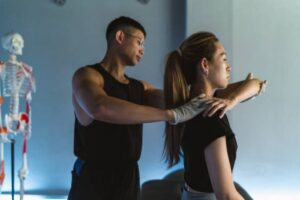Specialized NDIS physio Adelaide therapy provides participants with funding to access specialised support services. These supports are designed to improve Participants’ health and well-being. They also help them pursue their goals and live an ordinary life.
However, there are some teething issues with NDIS implementation. This is especially true for rural therapists.
Hydrotherapy
 Hydrotherapy is a form of physical therapy that uses hot or cold water to soothe pain and treat certain medical conditions. It is often used for patients who can’t exercise on land. Hydrotherapy sessions typically occur in pools, hot tubs, or physiotherapy tanks. However, the therapy can also be done at home in a bathtub or hot shower.
Hydrotherapy is a form of physical therapy that uses hot or cold water to soothe pain and treat certain medical conditions. It is often used for patients who can’t exercise on land. Hydrotherapy sessions typically occur in pools, hot tubs, or physiotherapy tanks. However, the therapy can also be done at home in a bathtub or hot shower.
Hydrotherapy has various benefits, including reducing muscle pain, increasing strength, and decreasing anxiety. It can also improve mobility and reduce the need for medication in rheumatoid arthritis patients. It can also be used during labour and childbirth to help relieve aches and pains. In addition, it can increase flexibility and decrease the amount of painkillers needed for patients with fibromyalgia.
During hydrotherapy sessions, the client lies on their back or sits in a chair in a heated pool. The specialist physiotherapist will guide them through exercises and movements to target their specific condition. These can include moving the arms, legs, or whole body. The warm water helps the muscles relax, increases blood flow, and reduces pain. It also provides resistance to strengthen the muscles and joints. In addition, the agitation from the movement of the water stimulates the nerves and improves coordination.
The temperature of the water can vary from hot to cold, and the speed and pressure of the water may change depending on the treatment. Generally, hydrotherapy sessions last 30 to an hour and are carried out several times weekly. People who do hydrotherapy often experience achy joints after each session, but this usually subsides with repeated sessions.
Infection is a significant risk of hydrotherapy, and the CDC recommends avoiding the practice if you have an open wound or a weakened immune system. It can also be dangerous for people with seizures or who are pregnant or breastfeeding.
Some forms of hydrotherapy are a simple soak in a tub or whirlpool, while others involve exercising in the water. Many people use contrast hydrotherapy, alternating between hot and cold water, to relieve aches and pains. Athletes often use this technique to recover from a workout. For more specialized NDIS physio Adelaide, check this out!
Anti-Gravity Treadmill
A popular exercise machine for patients and athletes, the Anti-Gravity Treadmill is used to help people walk and run in a weightless environment. It is also helpful for those who have musculoskeletal lower limb injuries and surgeries. In this machine, the patient or athlete wears a pair of shorts zipped into an air chamber that encloses the lower body like a bubble and reduces the weight felt by the knees, hips, ankles, and feet.
The participant can control the amount of unweighting they experience via an electronic panel, which can be varied in 1% increments. This allows users to train at a level comparable to their natural running cadence on a standard treadmill.
Researchers conducted a study to measure how the Anti-Gravity Treadmill affects an individual’s ability to replicate their natural cadence and increase it when exercising in this device. Participants began the experiment with a five-minute warm-up on a standard treadmill set to a self-selected pace. This was followed by measuring their regular walking or running cadence using an electronic sensor placed over the heel of their shoe. The data was compared with their rhythm on the Anti-Gravity Treadmill in one of nine randomised body weight conditions.
The result of the research showed that an individual’s natural walking or running cadence decreases with a decreased body weight percentage on the AlterG Treadmill. This is a significant finding for individuals with low mobility who require a period of reduced body weight to improve their mobility. Additionally, the device can be helpful for individuals recovering from lower limb injury or surgery, incorporating weight-bearing exercise into fitness programs after surgery, and improving gait and balance training in those with spastic cerebral palsy.
PhysioEx
PhysioEx is a revolutionary digital health platform designed to support individuals with diabetes mellitus. It provides users with tools and resources to help them manage their condition, including blood glucose monitoring and insulin management. It also offers guidance on diet and exercise. The PhysioEx website is accessible via mobile phone or computer.
Core Physio is a specialized NDIS physio Adelaide registered physiotherapy provider with over 80 skilled physiotherapists working across 12 locations in Adelaide. In addition to hands-on physiotherapy and Pilates, Core offers dry needling, shockwave therapy, and hydrotherapy at select locations. They are also a specialist NDIS physiotherapy provider for Paediatric and Women’s Health.